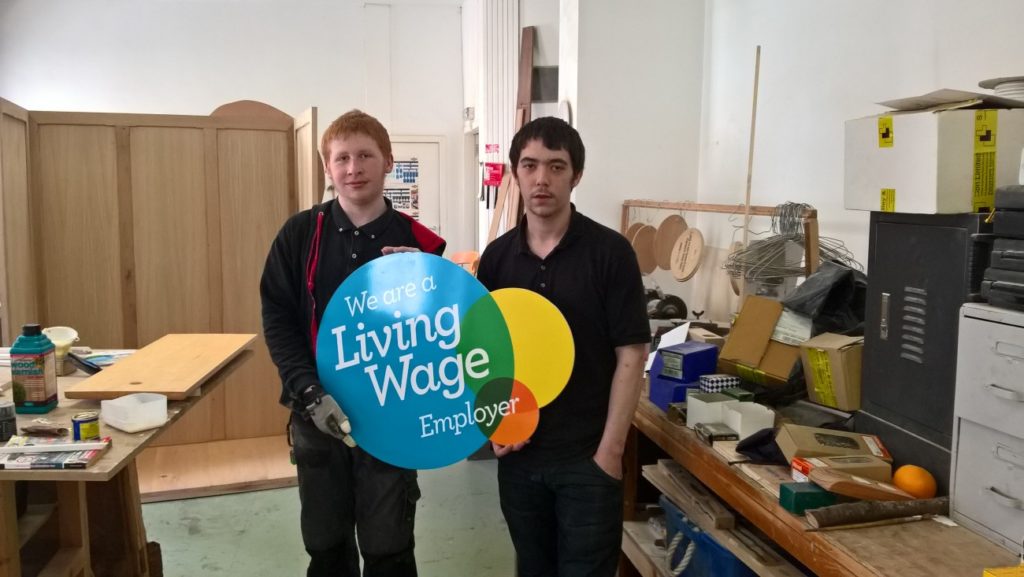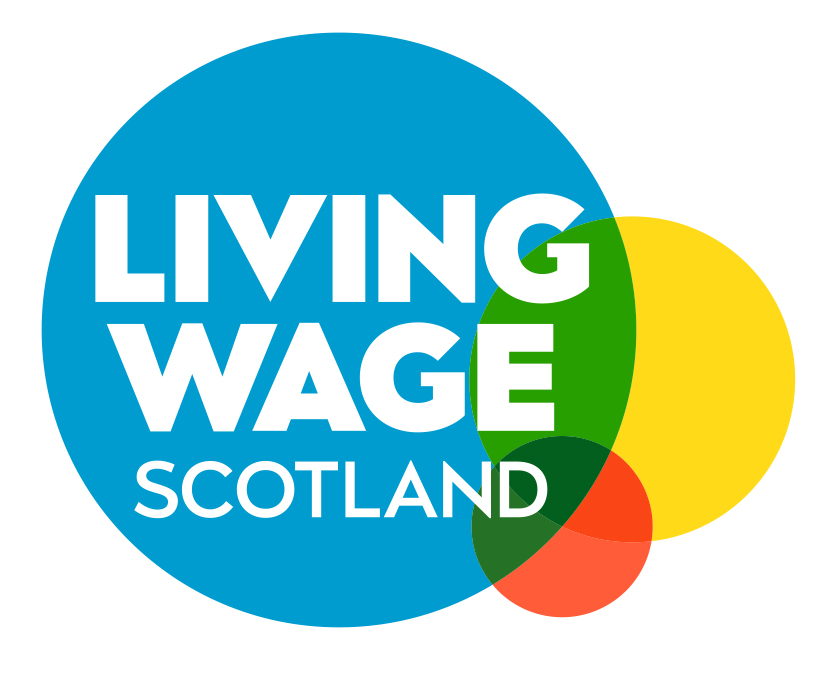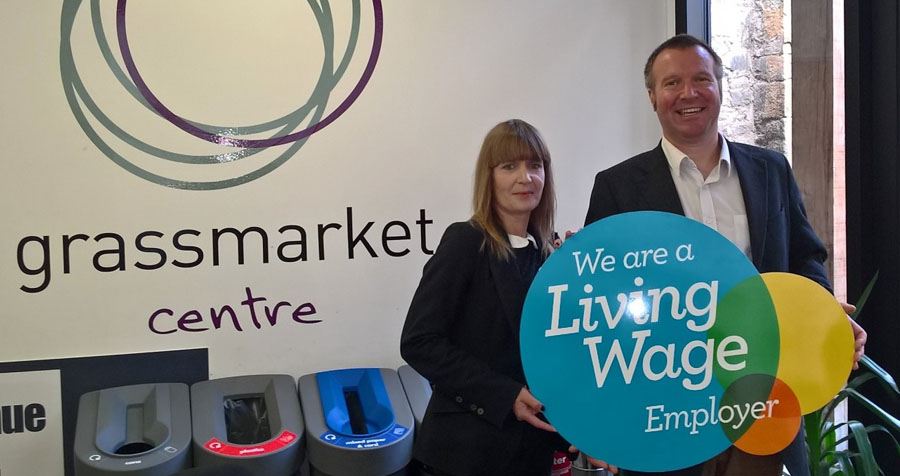The Employer: Jonny Kinross
Initially working with homeless people in the community, the project has since expanded its remit to work closely with adults with support needs and mental health issues. The charitable function at the core of the project aims to engage some of the most vulnerable people in the local community, offering around 30 activities each week; including cooking classes, arts, photography and producing the newsletter. The project achieved Living Wage accreditation in 2015.
Jonny Kinross, CEO since February 2015 tells us about the projects experience of joining the Living Wage movement. Jonny previously worked in the voluntary and public sector, so working on commercial strategy has been a slightly different experience. Jonny was the driving force behind the projects accreditation. He told us, “I have always felt that [the minimum wage] is not enough. I believe passionately that employer shouldn’t be allowed to pay people anything less than what they need to live on”.
Nonetheless, Jonny believes that Living Wage matches the values of the organisation, explaining, “… we are committed to Social justice and achieving equality in society”.
The café is open 7 days a week and attracts a large customer base by working in partnership with tour guides. Jonny highlights, “The Living Wage has had most benefit in the café.”
Reflecting on the start of their Living Wage journey, Jonny told us, “…I knew about Living Wage from other organisations and social media…but when I saw that a local restaurant had become Living Wage, it made me want to do it”. Despite Jonny’s recognition that going Living Wage was the “right thing to do”; it wasn’t without its challenges.
He explains,
“Our catering manager found it a challenge initially balancing the sales targets I expected of them with the cost of the living wage and how this affects the staffing budget in the catering most which employs the most staff. Catering is a low pay sector and customers expect competitively price tea and coffee. It then ripples through the department – affecting pay differentials as you would expect as a supervisor with more responsibility to earn more than other staff. We applied pay rises to at each level to maintain the pay gap between new starts and supervisors”.
In addition, Jonny shares that paying the living wage can mean competitors are sometimes able to win contracts based on price, and shares that catering and cleaning sectors are often under pressure to offer services cheaply.
In contrast to this challenge, Jonny highlights that one of the benefits of becoming a Living Wage employer, is being able to tender with integrity. Jonny elaborates; “Pioneering the Living Wage and making that commitment can be a challenge…especially in the catering sector– but somebody has to go first. The culture of losing contracts on price is now changing”.
With these challenges to report, we were interested in the benefits Grassmarkets Community Project have enjoyed as a result of Living Wage accreditation, and Jonny had quite a list, including reports of increased social media attention thanks to Living Wage. In summary, he told us;
“…it’s good to be able to say we are a good employer. We can say it and mean it. I hope [living wage] becomes the norm in my lifetime… the whole of society will benefit. A mass movement to living wage will make everyone’s lives better”. We couldn’t have said it better ourselves.

The staff:
Graham, 40
Graham works in the café. Without Living Wage, Graham would be receiving the UK government’s ‘national living wage’ rate of £7.20. Graham has been diagnosed with ME/Cystic Fibrosis. The majority of people diagnosed with this health condition can have fluctuating health. Graham works part-time to help with his health now. Grassmarkets have been supportive in helping him manage his work with his health condition.
. Graham said, “When on low pay – it can be stressful and can affect my health. A little extra can go a long way… for me; an extra £1.05 an hour has a huge impact…” When asked if low pay could impact his health in other ways, in addition to stress, Graham elaborates, “With my health condition – I sometimes have poor stamina. If I didn’t receive the living wage, I wouldn’t be getting the bus as often to work. This could affect my health”.
, “…I don’t smoke or drink, but for me, I’ve had to curtail social activities. Heating and eating are the priorities”. Nonetheless, the Living Wage has meant that Graham has a little extra to ease the pressure of living with his health condition on a low income. His commitment to the project was evident, so we weren’t surprised to learn that when not working, Graham volunteers at the project, facilitating one of the activities.
Graham explains;
“…At the moment – any spare time and energy I’ve got – I’m planning the self-esteem group. If I was getting a lower hourly rate, I would probably have to work more hours or find another job. I wouldn’t have a much spare time or energy to do things like that”.
When probed to think about business benefits to adopting Living Wage, Graham said; “Staff turnover here is low, everyone is very happy. There’s nothing forcing Jonny’s hand to do pay Living Wage; it shows leadership. It shows we are part of the initiative. Overheads may be more – but you can attract and expand and it could be easier to recruit.”
Graham praised Grassmarkets Community Project for becoming a Living Wage employer and noted; “You don’t have to be a charity or social enterprise [to become a Living Wage employer] everyone should be doing it as a matter of fairness”.
Craig, 24
Craig is a cleaner at Grassmarkets Community Project. He lives with his parents and brother. Craig also has daughter, Holly, who is 6 years old. Craig had already been volunteering at the projects wood workshop for around 3 years. He was unemployed at the time, and although he was seeking work, Craig struggled with his own mental health issues.
He told us the project helped build his confidence, and so was delighted when a job became available, and he was encouraged to apply. It was great news when he got the job to hear of the decent hourly rate.
Without the Living Wage, Craig would be receiving the national minimum wage rate for his age group, currently £6.70 per hour. In sharing his views on this, Craig told us,
“I think it’s unfair that people doing the same job are paid much lower wages for the exact same job. If I was on minimum wage – I would be getting a lot less than someone a little older than me”.
Craig explained that the Living Wage means he can afford little extra’s, like being able to take his daughter to soft play at the weekends.
Reflecting that other young parents are getting lower wages, he told us, “…Every employer should pay Living Wage; it would mean that people don’t have to wait until they are 25 until they are getting a decent wage”. He continues, “You can be under 25 but you want to get your house, have a child– but if you’re not getting a decent wage – you’re waiting on your life starting”.
Craig shared that he felt valued as an employee due to being paid the Living Wage. Referring to the experience of cleaning workers, Craig explains, “…We might not be doing the hardest work or the best jobs – but they are jobs that need doing. Paying a Living Wage make everybody feel better about themselves, [it shows] they are appreciated for doing these jobs and it makes people feel better about their employers.”
Being a “good employer” is hugely important to Grassmarkets Community Project. Jonny Kinross explained that, closely linked with the mission of the project, the project strives to offer fair practices in relation to supporting workers with health issues. They have strong policies of offering time off for medical appointments (which is not a statutory requirement), and proactively supporting people with health issues at work.
Jonny concluded by sharing that, in his view; many employers feel they are being responsible employers, but without committing to Living Wage, they are adding to rather than helping to deal with inequality. Jonny illustrates, “… It’s quite ironic – people don’t make the connection. You can have really compassionate people, working in business but without committing to something like Living Wage, they are creating inequality and perpetuating it”.
Reflecting on achieving accreditation and being part of the Living Wage community, Jonny tells us, “…we feel like we’re part pf a really positive club – a very progressive club. The Scottish Living Wage Accreditation Initiative invites applications from other employers who want to join this “progressive club”.


